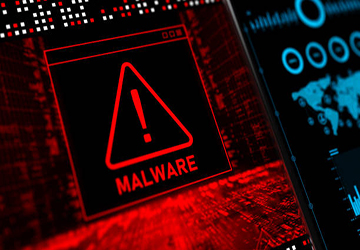Have you ever noticed your computer acting strangely lately? It may not be as swift as it used to be, or specific apps crash unexpectedly.
Have you recently asked, "Why is my computer behaving weirdly?" or "Is my data safe?"
Imagine the frustration if this were to escalate. If your digital buddy goes down, you might lose a lot more than convenience. You could be at risk of financial or data loss.
Your computer is more than just a tool—it's where memories are stored, work gets done, and countless hours of entertainment unfold.
These concerns are more common than you might think. Ignoring such signs could range from mere inconvenience to severe data breaches.
Many face these issues, often unknowingly. By equipping yourself with the knowledge in this post, you'll take a proactive step toward a safer, smoother computing experience.
Please read this blog post; we will tell you some warning signs that affect your computer with malware attacks and can cause data loss and how to avoid them.

4 Symptoms of a Malware Infection
Malware is like a sneaky thief that slips into your computer without you noticing. It can come from a suspicious email, a misleading ad, or a fake software update.
We must avoid malware because it can lead to stolen identities, lost money, or damaged files. Just like you wouldn't want burglars in your house, you wouldn't want malware on your computer.
1.Unusual System Behavior
Have you ever started your computer and witnessed abrupt shutdowns or applications freezing out of nowhere?
This could be an indication that malicious software is causing the disturbance. Recognizing this behavior can prevent further damage and potential data loss.
Regularly monitor your system's behavior. If it feels out of the ordinary, perform a quick malware scan. Always ensure you have reliable antivirus software installed. Regular updates are essential.
Key Aspects:
● Sudden freezes or crashes.
● Unrequested system restarts.
● Applications not responding frequently.
2.Unwanted Pop-ups and Redirects
When browsing the internet, encountering a sudden influx of pop-up ads or being redirected to unfamiliar websites can be highly frustrating.
Identifying these signs early can prevent you from accidentally clicking on malicious links, which could worsen the infection.
Equip your browser with a reputable ad-blocker or pop-up blocker. Never click on suspicious pop-ups; always double-check URLs to ensure you're on a legitimate website.
Key Aspects:
● Excessive pop-ups even on reputable websites.
● Unexpected browser toolbar additions.
● Frequent redirection to irrelevant websites.
3.Sluggish Performance and Overactive Hard Drive
If you've noticed that your once speedy computer has suddenly become tortoise-like, it might not be due to aging hardware.
Malware can often run in the background, consuming resources. Spotting and addressing this sign can restore your computer's performance and prolong its lifespan.
Refrain from downloading files or software from unreliable sources. This reduces the chance of malware sneaking into your system.
Key Aspects:
● A consistently overactive hard drive, even when the computer is idle.
● Unusual high CPU or RAM usage by unfamiliar applications.

4.Unauthorized Emails or Social Media Messages
Have friends or colleagues mentioned receiving strange emails or messages from your accounts? Malware, especially types known as worms, can send out mass messages in an attempt to spread to other devices.
Detecting this quickly can help you regain control of your accounts and prevent the malware from spreading further.
Regularly review the sent items in your email and messaging platforms. If you notice messages you didn't send, it's a clear red flag.
Key Aspects:
● Unexpectedly sent emails in your outbox.
● Friends or contacts reporting suspicious links or attachments coming from
your account.
Final Thoughts
In this digital era, our computers often become an extension of our lives. Like any trusted companion, they occasionally signal when they're not feeling their best.
From unexpected behaviors to unsettling slowdowns or even alarming instances of unauthorized messages, these are your device's subtle SOS calls.
As technology evolves, let's stay ahead by keeping our devices - and, by extension, our digital lives - safe and sound. Listen to your computer; it's often telling you more than you think.


